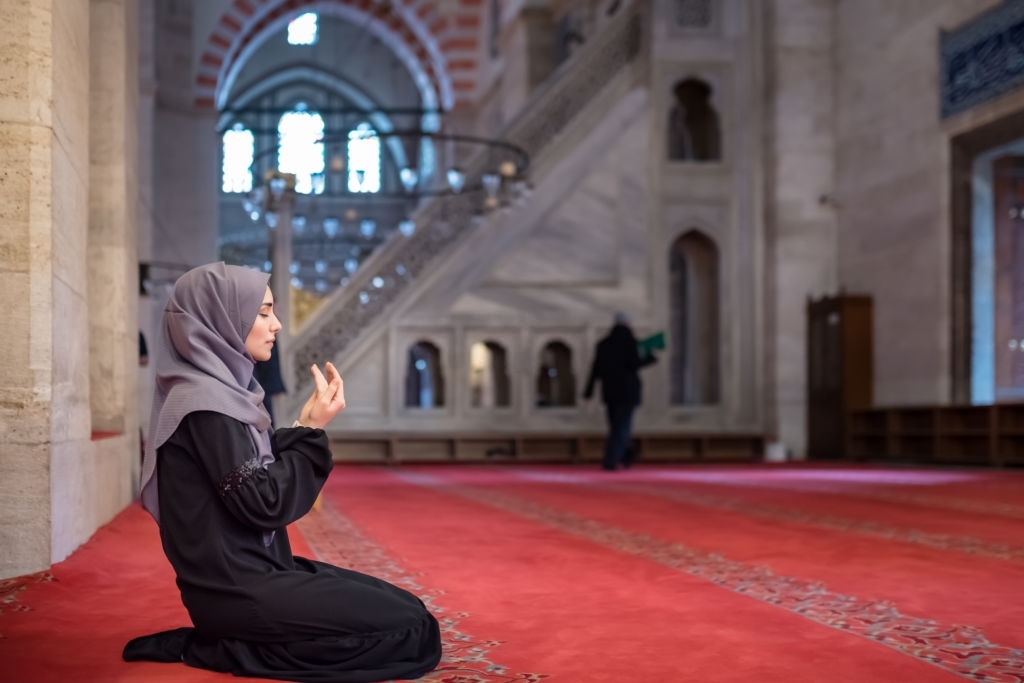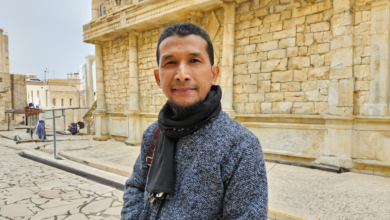

Oleh Ustadz Very Setiyawan, Lc., S.Pd.I., MH
Delivered at the Online Study on Sunday, October 25, 2020
Understanding and Virtue of Prayer
In language, prayer has the meaning of calling, inviting, inviting, or asking. Whereas prayer according to the term is a request from a servant to Allah so that what he wants is granted.
Prayer is the essence or brain of all worship. Worship in any form such as prayer, zakat, alms, fasting, pilgrimage, and all sholih deeds are a form of a request and how we answer the call of Allah SWT.
This is in line with the word of Allah SWT:
وَإِذَا سَأَلَكَ عِبَادِي عَنِّي فَإِنِّي قَرِيبٌۖ أُجِيبُ دَعۡوَةَ ٱلدَّاعِ إِذَا دَعَانِۖ فَنِّي قَرِيبٌۖ أُجِيبُ دَعۡوَةَ ٱلدَّاعِ إِذَا دَعَانِۖ فَلۡيَسۡتَجِيبُيُؤََِِِۡ
"And when my servants ask you about me, then (answer), that I am near. I grant the petition of the person who prays when he pleads with Me, then let them fulfill (all My commandments) and let them have faith in Me, so that they will always be in the truth ". [Surah Al-Baqarah: 186]
The above verse was also emphasized by a friend named Abu Dzar Al-Ghifari, he said: "The good deeds can complete prayer as salt gives taste to food."
From the best friend of Nu'man bin Bashir, the Messenger of Allah said:
إِنَ الدُّعاءَ هُوَ الْعِبادَةُ
"Truly prayer is worship". (Tirmidhi, Abu Dawud, Nasa'i, Ibn Majah, and Al-Hakim)
The friend of Anas bin Malik also reported that the Messenger of Allah said:
الدُّعاءُ مُخُّ الْعِبادَةِ
"Prayer is the brain (core) of worship". (HR Tirmidhi)
3 Ways Allah Grants His Servant's Prayers
Many of the people who only focus on the results of the prayer he prayed. In fact, Allah would have answered that prayer in His way.
There are three ways Allah will answer our prayers, as mentioned in the hadith narrated by the friend Abu Sa'id Al-Khudry:
إمّا أنْ تُعَجَّلَ لَهُ دَعْوَتُهُ ، وَ إمّا أنْ يُدَّخَرَ لَهُ في الآخِرَةِ ، وَ إمّا أنْ يُلْهَعَ
"Sometimes he (answers) his prayer is hastened, sometimes it is stored for him in the afterlife, and sometimes evil, such as with his prayer requests, is avoided." (HR Bukhari, Ahmad, Hakim)
Manners Pray
Praying is our way of communicating with the Creator, Allah SWT. If we only communicate with humans, we have to maintain adab, especially with Allah SWT.
In order for our prayers to be answered by God, let us keep the following adab:
- Eyeing for impossible times. Among the mustajab times are like the day of Arafah, the month of Ramadan, lailatul qodar, the afternoon on Friday, and the time of dawn or the last third of the night. Allah SWT said:
لۡأَسۡحَارِ
"And always ask forgiveness in the morning before dawn ”. [Surah Adz-Dzariyat: 18]
Rasulullah saw also said:
ينزل الله تعالى كل ليلة إلى سماء الدنيا حتى يبقى ثلث الليل الأخير فيقول عز و جل: من يدعوني فأستجيب له, و من يسألني فأعطيه, و من يستغفرني فأغفر له
"Allah Ta'ala descends every night to the sky of the world until the last third of the night remains, then He said: Whoever prays to Me, I will grant it, whoever asks for Me I will give it, and whoever asks forgiveness of Me I will forgive him for him. ". (Narrated by Bukhari Muslim)
- Take advantage of valuable situations and conditions, including:
- Abu Hurairah said: "In fact, the doors of heaven were opened when a line of mujahidin crawled and attacked the enemy in jihad fi sabilillah".
- Mujahid said: "In fact, prayer is used as the best time, so let you pray afterwards".
- Rasulullah SAW said: "In fact the prayer between two adhan (adhan and iqomah) is not rejected". (HR Tirmidhi, Abu Dawud, Nasa'i, Ibn Hibban, and Al-Hakim)
- Rasulullah SAW said: "A person who is fasting is not rejected by his prayer." (Reported by Tirmidhi and Ibn Majah)
- Rasulullah saw also said: "The closest distance between a servant and his Lord 'Azza wa Jalla is when he is prostrate, pray more in it". (Reported by Muslim)
- Facing the Qibla while raising your hand.
- Jabir bin Abdillah narrated that "Rasulullah saw when wukuf at Arafah, he faced the Qibla while praying until the sun set". (Reported by Muslim and Nasa'i)
- Anas bin Malik said: "Rasulullah saw (when praying) raised his hands so that the armpits were white". (Reported by Muslim)
- Lower your voice. Allah SWT said:
ٱدۡعُواْ رَبَّكُمۡ تَضَرُّعٗا وَخُفۡيَةًۚ إِنَّهُۥ لَا يُحِبُّ ٱلۡمُعۡتَدِينَ ٥٥
“Pray to your Lord with a humble voice and a soft voice. Indeed, Allah does not like those who transcend boundaries. [Surah Al-A'raf: 55]
Tadlarru ' it means to humble oneself and submit. While Khufyah is praying not openly. Al-Hasan Al-Basri said: "They are salafus sholih (previous pious people) if they pray earnestly, all they hear is hams (whispering voice).
As for what is meant "Allah does not like those who transgress" is; praying for the ugliness of a believer, asking for something inappropriate like that given to the Prophets, and raising his voice.
- Doesn't rhyme or use too many unnecessary sentences.
Shaykh Abdurrahman As-Sa'dy when interpreting Surah Al-A'raf verse 55, namely that "Allah does not like those who transgress" are as follows; asking for something not for him, clarifying prayers, and raising a voice.
Rasulullah SAW said: "There will come a people who are excessively praying and purifying." One purpose of overreacting is rhymes when praying.
Some of the salaf scholars said: "Pray verbally (in language) which shows submission, not in verbal (language) which is too fluent and loose".
- Khusyu 'is accompanied by hope and fear of Allah. Allah SWT said:
فٱستجبنا له ووهبنا له يحيى وأصلحنا له زوجه إنهم كانوا يسرعون في ٱلخيرت ويدعوننا رغبا ورهبا وكانوا لنا خشعين XNUMX
"So We allowed his prayer, and We gave him Yahya and We made his wife pregnant. Truly they are people who always hasten (do) good deeds and they pray to Us with hope and anxiety. And they are people who are devoted to Us ”. [Surah Al-Anbiya ': 90]
- Believing that his prayers will be answered by Allah. Rasulullah SAW said: "Pray to Allah while you are sure it will be granted, and know that Allah does not answer prayers from a negligent heart." (HR Tirmidhi and Al-Hakim)
Sufyan bin 'Uyainah said: "Do not let someone among you be reluctant to pray, in fact Allah granted the devil's request to be postponed until the Day of Resurrection".
- May repeat the prayer three times. Abdullah bin Mas'ud said: "When the Prophet prayed, he read it three times. And when he asked, he also said it three times. (Narrated by Bukhari Muslim).
The Holy Prophet also taught us when we believe that our prayers have been granted or get a blessing, so that we say alhamdulillaahilladzii bini'matihii tatimmush shoolihaat (Praise be to Allah who with His blessings sholih deeds can be perfect).
But if our prayer is suspended or we get a disaster, then say it thank Godllah 'alaa kulli haal (Praise be to Allah for all circumstances) ". (HR Baihaqi and Al-Hakim)
- Starting prayers by praising Allah and praying to the Messenger of Allah. Rasulullah SAW said: "If one of you prays, then he should start by praising Allah and worshiping Him, then he should recite prayers on the Prophet, then after that he may pray about what he wants". (Narrated by Abu Dawud and Tirmidhi)
- Starting prayers with repentance and istighfar, admitting mistakes, and fully facing Allah SWT. This last adab is the most basic of making a prayer hijab, because it relates to a person's heart. Because this request for forgiveness to Allah will open His grace as widely as possible.



